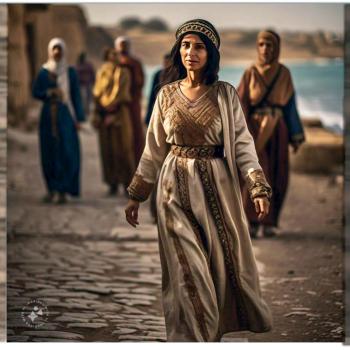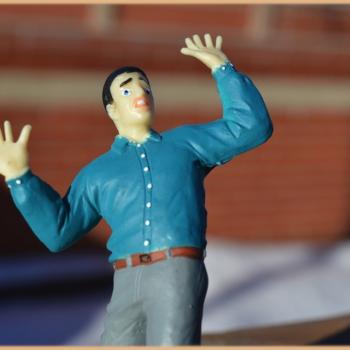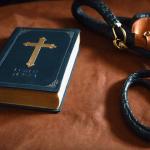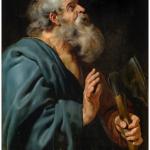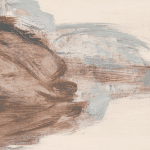This story highlights Christian values, emphasizing the teachings of Jesus.
Chapter 2: Christian advantage
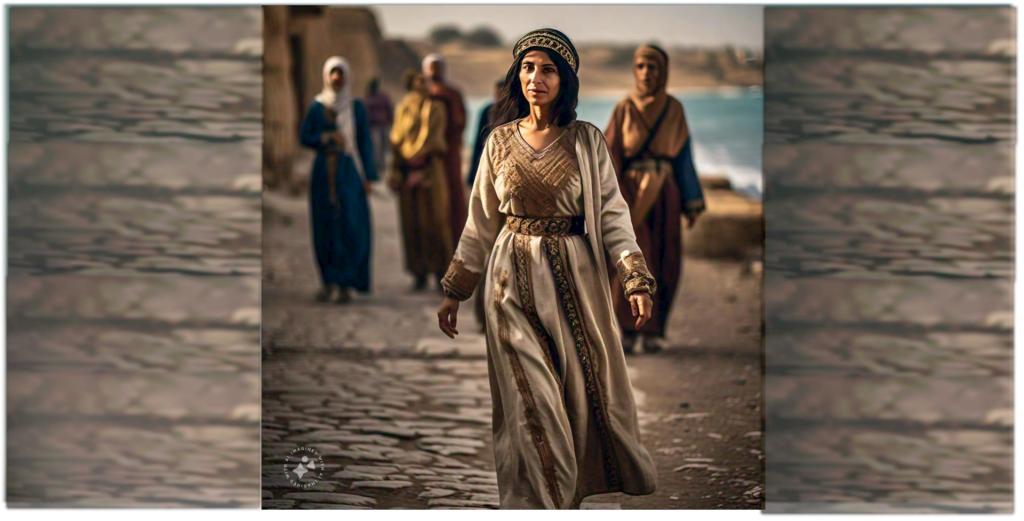
Judith image by Meta, enhanced by Dorian Cole
Despite the harsh sleeping environment just feet off the road, Judith woke feeling refreshed and excited about the people she was with. She brushed leaves and sticks from her plain brown robe, then shifted her body inside the robe to untwist the long chemise undergarment that had wrapped itself around her waist during the night.
She discreetly perused her bag and saw nothing was missing. Her sons had promised to bring more of her things later when they traveled north for trading, so she had kept her travel items to a minimum. She then pulled out her cloth of food and untied it.
Sharon was pouring wine into cups. She seemed to glow in the morning light as Judith studied her. She looked to be around 30-years-old with a youthful, warm, golden-brown complexion and piercing green eyes.
A vibrant silk scarf covered her dark hair, and she wore a flowing red robe with golden embroidery, hinting at family prosperity. A delicate silver necklace with a tiny crystal pendant dangled onto her robe. When she bent over to get another cup, she noticed the necklace and tucked it back under her robe. Judith wondered why Sharon didn’t hide any suggestion of wealth while traveling.
Sharon poured a cup of wine. “Jacob, please give this to Judith, along with a piece of that bread.”
Simon graciously presented them to Judith. “Our table is yours.”
Simon appeared to be with Sharon. He looked to be 35, more Arabian in appearance. His dialect sounded like he was from the Petra area. He had a commanding presence and a chiseled face. His dark hair was slicked back, revealing a prominent nose and piercing brown eyes.
Judith’s sons had pointed out dialects to her when she went to Sepphoris with them to help with trading.
He wore a flowing white robe with intricate silver threading, reflecting his wealth and apparent status. A golden signet ring adorned his finger, signifying his family’s prestige.
After a moment’s hesitation, Judith laid her cloth of food with theirs, untied it, and took a dried fig.
“I’m most grateful.”
“God’s table is always bountiful. Thank God with us.” They all bowed their heads. “Blessed are you, Lord our God. We are grateful for your provision.” Simon said. [Ephesians 13: 21]
“Mercifully brief,” Jacob said.
Rachel, her eyes flashing, gave him a loving jab. “Must you always be ungrateful?” The others laughed. She appeared to be a 25-year-old Jewish woman, probably from the Nazareth area from the sound of her dialect.
She had long, dark hair, and expressive brown eyes. She wore a traditional white robe with a blue mantle, symbolizing her modesty and piety. A gold pendant in the shape of a menorah adorned her neck, signifying her Jewish faith. Intricate henna designs adorned her hands, showcasing her cultural heritage.
Judith gathered that Rachel and Jacob were together since they slept together. He wore a simple white tunic with a leather belt, characteristic of his humble occupation. His clothing and his strong, rugged, and calloused hands suggested carpenter or boat builder working with stone or wood. He looked to be 28, was quiet and reserved, but had a kind face.
Hints of red flecked his short, dark beard, and warmth sparkled in his bright blue eyes. A fish hung from his neck, a testament to his devotion to something Judith didn’t know. Fishing?
The group seemed like a very eclectic assortment of people to Judith. Had they planned this journey together? They said they planned to create a community.
They swiftly finished eating, slung their bags over their shoulders, and silently began their journey.
The morning sun painted the sky in hues of pink and orange as the group of travelers made their way along the dusty road. The rhythmic click-clack of sandals on the cobblestones provided a steady cadence to their conversation, a melody of shared experiences and newfound beliefs.
Judith, who was a woman of weathered wisdom and quiet strength, found herself drawn to these companions, their spirits as warm as the rising sun. She had left behind the familiar comforts of her home, seeking solace and purpose in this unfamiliar journey. The concept of “followers of the way” intrigued her, a phrase that held within it a promise of liberation and hope.
“May I ask what ‘followers of the way’ means?” Judith asked.
“If you’re not against followers of Jesus, then ask us anything you want,” Rachel said.
Sharon, with her radiant smile and infectious enthusiasm, explained the essence of their faith. “Jesus showed us the way to live,” she said, her voice carrying a gentle conviction. “It makes your life and relationships better. It’s a path of love, a path that leads to a richer, more fulfilling life, and ultimately, to eternal life.”
Judith’s brow furrowed in contemplation. “Eternal life?” she questioned, her voice laced with skepticism. “Who would want to spend eternity in Hades? Even in its most pleasant corners like Asphodelus! Life is hard enough without going on forever.”
A ripple of laughter spread among the group. Rachel, free of yesterday’s exhaustion, was now a spirited young woman with a quick wit. She responded, “Forget Hades! It’s about living with Jesus in a glorious garden. But that’s not really the point. It’s about living a life filled with love and compassion, just like the way we follow the Law, but without the burden of guilt and shame.”
Judith felt puzzled. “If you follow the law, then why do you need Jesus?”
Jacob, who walked along quietly with a steady gaze, added, “The Law is like a load of bricks, weighing us down. We were constantly striving for perfection, but falling short. Each day was drudgery and failure. Jesus showed us a different way, a path of love, forgiveness, and grace from God.”
Simon added, “We’re never good enough for God. Only once a year do we seek and get forgiveness for sins against God, during Yom Kippur, the Day of Atonement. And we have to sacrifice whether or not we can afford it. I’ve seen many offering gifts appear at the Temple in rags.”
Jacob added, “Our sins are heavy burdens. Sacrifice to atone for them makes them an even heavier burden. Imagine you are in the sea and wearing a robe with large rocks around your neck. You’re drowning from the rocks of sin and sacrifice. You can’t make it to dry land.”
Judith understood. But she was still confused. “Why do you still have the law? I couldn’t bear that.”
“It’s our heritage,” Rachel explained. “But Jews never believed the Jewish law could apply to others. It was a covenant between Jews and God given to us through Moses. And Jesus didn’t send his apostles out to spread the law. Only love.” [Acts 15:1-29]
“I don’t understand. What did Jesus do for you then if you still have the law?”
“All we have to do is ask God for forgiveness,” Jacob said. “And if we’ve offended someone we need to make it right.”
Judith walked for a while, thinking, then said, “I’m still confused. Jews always make it right with each other, and they get forgiveness from God, even if it takes a while. What’s changed?”
Rachel sighed. She thought they had explained enough and given great example. She said, “It’s like you’re a rotten fig that can’t heal itself, so you just continue to rot.”
“Then what does Jesus do to fix this?” Judith asked.
“We are forgiven immediately by just asking God. Then we can get on with becoming better people,” Jacob explained.
Judith began to understand. The road stretched out before them, perhaps a symbol of the spiritual journey they were all undertaking. With each step, Judith felt a growing sense of belonging, a connection to these fellow travelers who shared her quest for meaning and purpose. “So instead of being rotten fruit, you’re rotten spots go away.”
The gentle morning breeze carried the salty scent of the sea, promising a fine day ahead. The early morning sun was turning into a fire that made each of them shed their outer garments.
Simon, who had stayed silent all this time, continued to explain, “Guilt and shame are demoralizing. They weigh you down, damaging your relationship with others. They bring you into an endless spiral of guilt and doing more bad things. It’s like you suffer and then you suffer more because you feel you’re not a good person. And you drown in it.”
“Exactly. And Jesus will help you become better by helping you replace hate with love for others,” Rachel continued.
Sharon explained, “Haven’t you noticed that when someone does something wrong to another person, often they become enemies who hate each other? But when we add love for others to this, we replace hate with love. And then those people patch up their differences and become friends again.”
“This works in marriage, in families, in business, with neighbors, even with enemies,” Simon said.
“I don’t know if I could do that,” Judith countered. “Once someone is on my shit list, then I know I can’t trust them. That’s the end.”
“It takes practice,” Rachel said. “Once you see the difference in your relationships, you apply this to more people. When you’re kind to others, they are kind to you.”
Sharon looked at Simon. “Simon and I used to argue all the time. It would break our back to do something good for each other. Now it’s different.”
“Now we only argue half the time,” Simon said with a laugh.
“We have our differences. But we get past them with love.”
Rachel said, “I just say, ‘I win,’ and Jacob falls to the ground laughing because it’s so absurd. How can you argue with that?”
They all laughed joyously.
Jacob said, “Jesus taught us to love your enemies and to forgive others who offend you seventy times seven.”[Matthew 18:21-22]
“I think following this Jesus must be really difficult,” Judith complained. [Luke 9: 23-24]
“Maybe it’s difficult to start, but it makes life so much better. You don’t fight everyone all the time and they don’t fight you,” Rachel said.
“I do argue with my sister a lot. And her husband. And that’s where I’m going to live.”
“Then following Jesus would be a major benefit to you,” Simon said.
“I liked Jesus. I felt so comfortable in his presence. I couldn’t forget him. But I couldn’t do this on my own.”
“That’s why we start communities. And we meet each Saturday or Sunday to talk with each other about our faith and the problems we face.”
“Couldn’t you start your community in Tyre? Why go on to Sidon?”
“Paul and John thought we would be more effective in Sidon. And there already is a small community in Tyre. We can introduce you.”
“I think I would like that.”
As they walked further, Judith never wanted to part from these people. She wanted them in her life. “Accompany me to my sister’s house,” she blurted. “She’s a gracious host and likes visitors. And her husband talks about Beelzebub, but Esther just shakes her head and ignores him. She won’t pray to Beelzebub.”
“Beelzebub. That’s another name for Ba’al,” Simon mused. “The powerless one who wants sacrifices for nothing.”
Sharon bumped him with her elbow. “Let’s not demean others’ gods. That’s divisive. Let’s just talk about Jesus.”
A flicker of doubt crossed Judith’s face. “But what about those who don’t believe in Jesus?” she asked. “Are they doomed to Hades?”
Simon spoke up. “I believe God’s love is vast and unconditional,” he said softly. “While we have been given a clear path to salvation through Jesus, I don’t believe God would deny anyone the opportunity to experience His love and follow it.”
Rachel chimed in, her voice filled with hope. “Maybe it’s not about believing in a specific way, but about living a life that reflects God’s love,” she suggested. “Perhaps those who are sincere in their search for truth and who love others will find their way to Him, even if they don’t know His name.” [Romans 2:12-29, Romans 2:14]
Rachel turned to the others. “Didn’t Jesus say as much? He invited the poor, prostitutes, tax collectors, and others to his table. And he was so impressed with the faith of people he met who weren’t Jews, such as Roman soldiers and people outside Jewish areas, he said, ‘I tell you that many people will come from east and west and sit at my table with Abraham, Isaac and Jacob in the kingdom of Heaven.’” [Matthew 8:11]
Judith’s heart was filled with peace. “Listening to you talk about Jesus, I feel alive. It’s like being born again. My spirit is so light.”
“Then this must be your path. We do call it being born again,” Rachel said. “Jesus called this the Good News. We spread it to others, even all over the entire world. We tell others how the Good News of forgiveness frees us from the burden of sin and brokenness, and brings healing and abundant life of improved relationships in our lives.”
“In Jesus, your spirit can grow unhindered by all the little things we do wrong every day,” Sharon added. “We all sin. We can’t help it, we’re human. Yet we can still learn truth from God every day.”
Jacob added, “Jesus said he is the way, the truth, and the life. It’s very true. When we follow the way he showed us, we find love is our spiritual truth and our life blossoms. Jesus is a symbol of the love of God for all the world.” [John 14:6]
A comfortable silence fell over the group as they pondered these profound questions. They were near Tyre, so their pace was more leisurely. Judith welcomed the change of pace and was pleased she would not arrive worn out. And it would give her more time to ask about Jesus. They seemed eager to talk about him.
________________________
– Dorian
Copyright notice: On the Road Christianity, Copyright © Dorian Scott Cole. You can read this in churches, but you cannot include it in other works or collections in any publishing format including electronic forms. Others cannot sell this story.
Our answer is God. God’s answer is us. Together we make the world better.
Restore and recreate. Take time to celebrate life. Laugh, sing, and dance regularly, even every day. Happy. I Hope You Dance
Bible scripture verses are New American Standard Version (NASB), unless noted.
Author and books
Appease the Volcano: What does God require from people? The voices of the ancients from many religions echo much of the same things: It starts with law, then mercy and forgiveness, then love.
The Prophetic Pattern: Ancient and Modern Prophecy: How to distinguish the intent of various types of prophecies and oracles, both ancient and modern.
Preparing For the Future Of Work and Education: Analysis of the kinds of jobs that AI and Robotics will displace, and the educational requirements for them. AI will replace or augment thirty percent of jobs. This is an in-depth analysis citing many authoritative sources.
Author Website: Dorian Scott Cole








